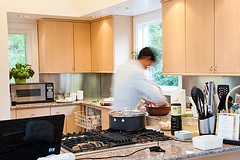29 Top Energy-Smart Tips for Kitchen Appliances
 Looking to save energy when you use the most common appliances in your kitchen? Here’s a complete collection of the best tips we've found. Most of them are low or no cost, to boot.
Looking to save energy when you use the most common appliances in your kitchen? Here’s a complete collection of the best tips we've found. Most of them are low or no cost, to boot.
Refrigerator/Freezer
1. Set your refrigerator temperature at or slightly below 40 degrees F (you may need to adjust it a little lower in the summer) for the most efficient usage.
2. Quick-cool cooked dishes to save energy and ensure safer food. Remove food from its cooking pot and place in shallow storage containers, and cool inside a larger container of cold water. Add a few ice cubes to soups and similar preparations.
3. Keep the outside of the fridge cool too. Make sure it’s surrounded by several inches of empty space, especially in back, for air circulation. Protect from hot spots such as the stove or an overly sunny window.
4. Plan your trips to the fridge just like you plan trips to the store – think ahead about what you will need. Take everything out all at once, and then put all back in one shot.
5. Pack your freezer space, adding jugs of water to fill in empty spots, BUT underload the fridge section to allow for cold air circulation.
6. Have a Houston handyman replace your fridge door seal if it’s not doing its job – keeping cold air inside and Texas summer air out.
7. When purchasing a new refrigerator, don’t buy a larger size than your household needs or you’ll be wasting power. A side-by-side model may be more convenient but conventional style is more energy-wise.
Stove Top
8. Prepare double batches of stews and the like so you can freeze half for another meal.
9. Cook at off-peak hours, particularly in summer, to lessen the burden on the electrical system and avoid overheating your home.
10. Cook in pans that are the correct size for your burners. Even better, use a pressure cooker.
11. Experiment with cooking times – slow food is trendy but your spaghetti sauce may be just as tasty after one hour of simmering as after four.
12. Cover your pots – keep the heat inside to cook your food.
13. Try recipes for energy-economical one-pot meals.
Oven
14. Unless you’re doing fancy baking, like a delicate angel cake or soufflé, it's usually not necessary to waste electricity or gas by preheating the oven.
15. Take advantage of every bit of oven heat. Turn it off a few minutes before your brownies or baked potatoes are done and finish them up by means of residual heat.
16. Whenever possible, peek through the oven window to check doneness. Every time you actually open the door, the result is heat (read “energy”) loss.
17. Bake several items at once, even if it means buying an additional rack.
18. If you must run the self-cleaning feature, do so immediately after a baking spree, to save the energy involved in heating the oven.
19. Minimize use of energy-hungry self cleaning. Instead make sure anything that goes into the oven is in large enough pans that it won’t overflow into a gooey mess.
20. For extra protection, place a silicone oven liner or an old cookie sheet on the lower rack.
21. Don’t line the bottom of your oven with foil. It can block heat flow and may become a fire hazard, especially in a gas oven.
22. Utilize your toaster oven or microwave (which uses all its energy for heating food, not the container, the oven itself, or the air in your kitchen) for small batches.
Dishwasher
23. Opt for the dishwasher over hand washing – it uses 33 percent less hot water.
24. Scrape, don’t rinse, dirty plates or rinse with just cold water.
25. Run only full loads, on the energy-saving cycle.
26. Turn off your dishwasher before the drying cycle starts, open door, and allow to air dry.
27. Buy a low water consumption, low operating cost model.
Garbage Disposal
28. Energy-saving cold water works just as well to operate your garbage disposal as hot does.
29. Cut down on garbage disposal use by composting suitable organic waste.
Laura Firszt writes for networx.com.
Looking for a Pro? Call us (866) 441-6648

Electrical Average Costs
Electricians Experiences

Light Fixture And Vent Fan Repair Inspires Me To Get More Done

Ceiling Fan Replacement By A Fast, Knowledgeable And Reasonable Electrician



